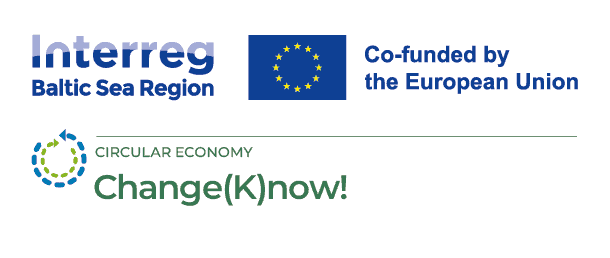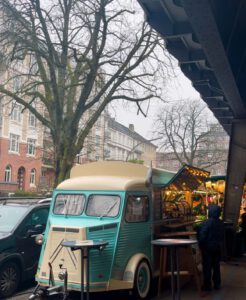
How reusable packaging is changing local markets – A chat with BEF Germany
29 April 2025
In this interview, the BEF team shares key takeaways, including what worked, what didn’t, and how transnational collaboration helped them adapt and improve along the way.
***
BEF Team: Marika Hellmund, Florian Bortic
What’s BEF Germany & Suri Signature been working on lately as part of the Change(K)now! project?
We’ve been testing reusable food packaging systems at Hamburg’s local markets, in collaboration with Suri Signature. Our goal is to help shift from single-use to reusable containers in takeaway food—supporting a circular economy and cutting down on packaging waste.
Sounds like a good step toward growing awareness and circularity of the food system. How did you test it?
We tried two approaches: stainless steel containers (reuser-owned) at Goldbekmarkt, and a centralized pooling system (provider-owned) at Isemarkt. We wanted to see what worked best in local market settings.
And what did you find?
The centralized system didn’t perform as well at Isemarkt. That market has more tourists and fewer regulars, so people were less likely to return the containers. Also, the container sizes didn’t match Suri’s food offerings very well.
What about the people? Were customers open to reusable?
Getting customers on board has been one of the biggest challenges. But when we had info stands and engaged directly with people, interest really picked up. In fact, usage of reusable containers doubled during those campaigns.
What role did Suri’s staff play?
A big one. We realized their team also needs targeted training—to help them communicate the benefits and avoid slipping into single-use habits, especially during busy hours.
Were there any logistical challenges?
Definitely. Every market day requires careful preparation – stocking the trucks with containers and materials. It’s a lot, so we’re now working on standardizing that process to make it smoother.

Any improvements coming to the reusable containers themselves?
Yes! We’re incorporating customer feedback—adding transparent lids, improving design, and making sure everything is leak-proof. We’re also exploring small incentives like a 4% discount to encourage people to choose reusable.
And how has the international part of the project helped?
It’s been incredibly valuable. Exchanging experiences with other Baltic Sea region partners has helped us learn, adapt, and improve our approach.
Last question—what’s the big takeaway from this pilot so far?That switching to reusable at markets is possible—but it takes smart communication, committed teams, and some operational tweaks. With the right support, it can really work.
***
Read more about the results so far in this news.





